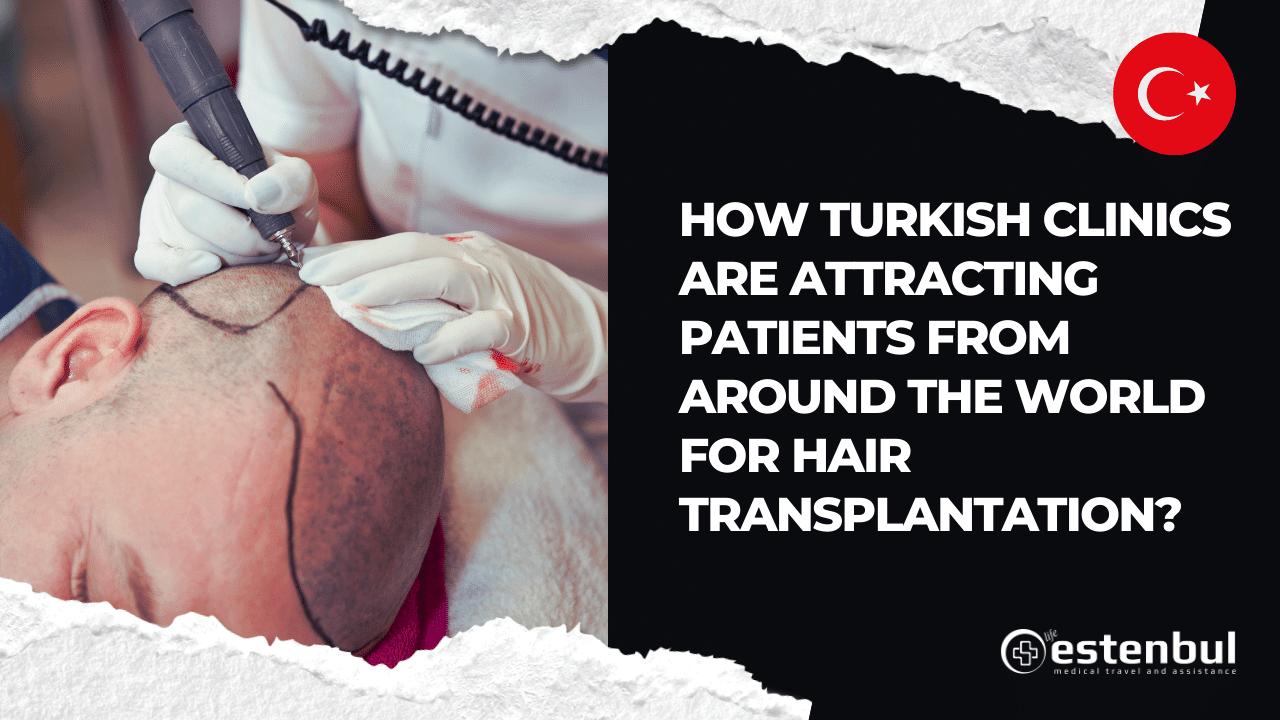
Articles
How Turkish Clinics are Attracting Patients from Around the World for Hair Transplantation?

Hair transplantation is a booming industry, and Turkey has become a major destination for those seeking the procedure. In recent years, Turkish clinics have attracted a growing number of patients from around the world due to their advanced techniques, high-quality facilities, and affordable prices. In this article, we will explore why Turkey has become a hub for hair transplantation, the latest technologies used by Turkish clinics, and the reasons behind the increasing popularity of hair transplantation in general.
Introduction
Hair loss can have a significant impact on a person’s self-esteem and confidence. Hair transplantation is a cosmetic surgical procedure that involves transplanting hair follicles from one area of the body (the donor site) to another (the recipient site). The procedure has gained popularity in recent years, and Turkey has become a leading destination for those seeking treatment.
The history of hair transplantation
Hair transplantation has been around since the 1950s, but the technology has evolved significantly over the years. The first hair transplant involved transplanting large grafts of hair, which often resulted in an unnatural appearance. However, with the advent of micrografting techniques, the procedure became more refined, and today, hair transplantation can produce natural-looking results.
Why Turkey?
Turkey has become a hub for hair transplantation for several reasons. One of the main reasons is the country’s geographical location, which makes it easily accessible from Europe, the Middle East, and Asia. In addition, the Turkish government has taken steps to encourage medical tourism, making it easier for patients to travel to Turkey for medical procedures.
Quality of Turkish clinics
Turkish clinics are known for their high-quality facilities and experienced doctors. Many clinics have state-of-the-art equipment and employ the latest technologies to ensure the best possible outcomes for their patients. Turkish clinics also have strict regulations in place to ensure patient safety and prevent complications.
Advanced techniques used by Turkish clinics
Turkish clinics use a variety of advanced techniques to perform hair transplantation. One such technique is Follicular Unit Extraction (FUE), which involves harvesting individual hair follicles from the donor site and transplanting them to the recipient site. FUE is minimally invasive, and the recovery time is shorter than traditional hair transplantation techniques.
Another technique used by Turkish clinics is Direct Hair Implantation (DHI), which involves using a specialized tool to implant hair follicles directly into the recipient site. DHI results in a higher hair survival rate and a more natural-looking hairline.
Cost-effectiveness of hair transplantation in Turkey
One of the biggest reasons for the popularity of hair transplantation in Turkey is its cost-effectiveness. Hair transplantation in Turkey costs significantly less than in other countries such as the United States, Canada, and European countries. Patients can save up to 80% on the cost of the procedure by choosing to have it done in Turkey.
Safety concerns
While hair transplantation is generally safe, there are still risks associated with the procedure. Patients should be aware of the potential complications, such as bleeding, infection, and scarring. However, Turkish clinics have strict regulations in place to minimize the risk of complications, and experienced doctors perform the procedures.
Popularity of hair transplantation worldwide
Hair transplantation has become increasingly popular worldwide, with more and more people seeking the treatment each year. According to the International Society of Hair Restoration Surgery (ISHRS), more than 635,000 hair restoration procedures were performed worldwide in 2019, a 16% increase from the previous year.
The popularity of hair transplantation can be attributed to several factors, including the increasing social acceptance of hair loss treatment, the rise of medical tourism, and the advancements in technology and techniques.
Hair transplantation tourism in Turkey
The popularity of hair transplant in Turkey has given rise to medical tourism in the country. Patients from all over the world travel to Turkey to have the procedure done, taking advantage of the country’s advanced techniques, high-quality facilities, and affordable prices. Turkish clinics have been proactive in catering to these patients, offering all-inclusive packages that include accommodation, transportation, and other services.
Conclusion
In conclusion, Turkey has become a leading destination for those seeking hair transplantation due to its advanced techniques, high-quality facilities, and cost-effectiveness. Turkish clinics have been able to attract a growing number of patients from around the world by offering state-of-the-art technologies, experienced doctors, and all-inclusive packages. As the popularity of hair transplantation continues to grow, Turkey is poised to remain a major player in the industry.
FAQs
Is hair transplantation painful?
Hair transplantation is generally not painful, as patients are given local anesthesia to numb the area.
How long does the procedure take?
The duration of the procedure depends on the number of hair follicles that need to be transplanted, but it can take several hours.
Are there any risks associated with hair transplantation?
As with any surgical procedure, there are potential risks and complications associated with hair transplantation, such as infection, bleeding, and scarring. However, these risks can be minimized by choosing a reputable clinic with experienced doctors.
How long does it take for the transplanted hair to grow?
It can take several months for the transplanted hair to start growing, and up to a year or more for the full results to be seen.
Can anyone have hair transplantation?
Not everyone is a candidate for hair transplantation. The suitability of the procedure depends on factors such as the extent of hair loss, the quality of the donor area, and the patient’s overall health. A consultation with a qualified doctor is necessary to determine if hair transplantation is right for an individual.

